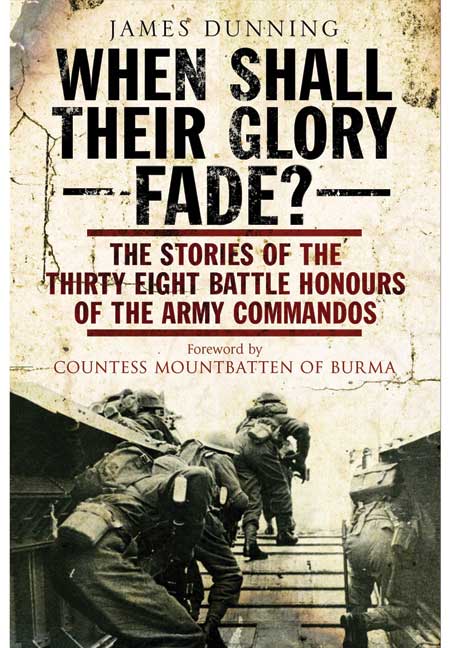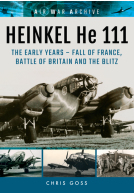When Shall their Glory Fade? (Hardback)
The Stories of the Thirty-Eight Battle Honours of the Army Commandos

Pages: 304
Illustrations: 16 pages of plates
ISBN: 9781848325975
Published: 11th April 2011
(click here for international delivery rates)
Order within the next 7 hours, 56 minutes to get your order processed the next working day!
Need a currency converter? Check XE.com for live rates
| Other formats available - Buy the Hardback and get the eBook for free! | Price |
|---|---|
| When Shall their Glory Fade? ePub (12.4 MB) Add to Basket | £6.99 |
Written by a Commando veteran of the Second World War, this is a remarkable, vivid and honest account of the battles and actions behind the thirty eight Battle Honours that were awarded to the Army Commandos by Her Majesty the Queen in 1958. Only operations deemed to be ‘thoroughly outstanding feats of arms’ were mentioned in the battle honours list. It therefore represents only a fraction of the raids and battles fought by the Commandos in their five years of active service.
These Battle Honours are emblazoned on the Commando Flag that hangs in Westminster Abbey in London, almost opposite the tomb of the Unknown Warrior.The story of each honour is presented in the most direct way, using the first-hand experiences of the commandos, officers and men who actually took part in the fighting.
‘There have been many histories of the commandos in the past, but this one is special, in a way, because it\'s been written by a commando, and refers to the memories and reminiscences of the men themselves, those whose glorious history is encompassed on the Commando flag in the Abbey. These first-hand accounts of the thirty-eight commando operations are poignant and inspiring.’
Books Monthly
What cannot be doubted is Dunning's admiration fro the men of the commandos, their bravery and effectiveness.
Oxford & Cambridge Club Military History Group
The Anecdotes have skilfully been woven into the narrative.
The book is written in an effective and interesting way; it is a page turner that goes at a pace from battle to battle covering a huge subject clearly and concisely given this was five years of war across the world. The book does not exclude the Royal Marine and Middle East Commandos totalling with the army 25 Units therefore in parts the more specialist reader will find the level of information sketchy. But the book is not for the enthusiast as what is described in the main will be known. For the casual or interested reader this will be an
Surrey Constabulary History Journal and Military History Group newsletters, September 2016
eye-opener of a book detailing what courage actually means.
The Commandoes - first of our present day special forces, was formed in 1940: a crumb of an idea by Winston Churchill. In his youth, forty years earlier, he was in South Africa during the Boer War. At that time Dutch settlers formed an irregular mounted military force known as Commandos. Punching above their weight they attacked British regular troops causing heavy losses and damage. In the process taking Winston Churchill prisoner.
Richard Gough - Military Author and historian
In 1940 ,Germany was on the verge of invading Britain and there was very little the country had to stop them, never-the-less Churchill decided to get-in the first blow. He formed a new special unit of volunteers to strike hard, fast and withdraw. He gave it the title Commandoes. Their exploits was a morale raiser at home, and were the tip of Churchill's sword in the fight back to defeat the country's enemies Germany,Italy and later Japan.
In his book 'When Shall their Glory Fade' James Dunning a Commando veteran, describes thirty eight battle honours: a catalogue of personal accounts by survivors. For many of a certain age the roll call of Honours will bring back many memories, the Lofoten raid in Norway, the suicidal raid at St Nazaire, Dieppe, the bloody stalemate on Anzio beach-head to just mention a few. The Commandoes were in the fore on each occasion.
The Commandoes were highly trained, lightly armed, averse to risk with fire in their bellies. Special trained for a specific role: but often senior officers not appreciating their value used them simply as infantrymen. The author brings out the gritty side of war: on D Day bodies of soldiers in the sea wallowing in the shallows, body parts, friends shot down alongside you, trekking miles in the pouring rain carrying one's personal weapon and a back pack of 100lbs then leading an assault on an enemy position. Both success and failure had its cost which could be almost 50% causalities, dead, wounded and missing. These vacancies were replaced by reinforcements from the Commando Training Centre at Achnacarry in Scotland.
An absorbing work supported with maps and photographs.
This is a story about the British military force that inspired special forces around the world, written by a Commando. British Commandos served in every theatre of WWII. Between the Dunkirk evacuation and the large scale raid on Dieppe, the Commandos were the only direct action force attacking the Germans in Occupied Europe as a uniformed organization of the British Army. The author has told their story with authority and feeling. This is a must read history from WWII.
Firetrench
Read the full review here!
In 1851 half the population were in the countryside, so most people will have rural ancestors. Jonathan brown, honorary fellow of hthe Museum of English Rural Life, has compiled this readable and informative guide for family historians, in which he explains the structure of rural society nd its people – the migant workers, the farm labourers, the farmers, the village tradesman, the professional classes and the landowners – to discover who they were, how they lived, what records they might have left, and how to locate and decipher these historical resources.
Countryman, March 2012
The book focuses in the raids and battles that ked to battle honours. Its author served with No. 4 Commando, and was thus a participant ins ome fo the raids he describes, before becoming a commando instructor. This might lead one to expect that the book was written some time ago, but that isn’t the case- this is a very recent piece of work, first published in 2011. The author thus has two advantages – in the nearly seventy years that have passed many of his fellow commandos had published in 2011. The author has published accounts of their actuins, and most official documents have been declassified. There are thus plenty of eyewitness accounts and extracts from official documents, and in particular war diaries.
History of War
Written by Commando veteran of World War 11, this is a remarkable, vivid and honest account of the battles and actions behind the award of the thirty eight battle Honours that were awarded to the Army Commandos by Her Majesty the Queen in 1958.
Kent Family History Society Journal, Dec 2011
In his book WHEN SHALL THEIR GLORY FADE James Dunning has successfully combined a meticulously researched history development of Commando forces during World War II with absorbing eminently readable and human accounts of the courage, daring and military expertise that led to the award of so many battle honours.
Brigadier Jack Thomas, President, Commando Veterans Forum
The Army Commando was formed at the request of Winston Churchill.
WW2 Connection, Les Tanner
His directive dated 18th june 1940 stated that he advocated limited
offensive actions against the enemys extended coastline.
The author himself a former wartime Commando who served in No 4
Commando after volunteering in 1940, also served as an instructor
at the Commando Basic Training Centre in Achnacarry, has put together
a superbly descriptive and first hand account of the Army Commando's
38 Battle Honour's. Included are their combat in Norway, Dieppe, Normandy,
And Flushing during WW2.
Their existence as a military formation was short, only 5 years, but in this short time they proved themselves to be a brave,determined and aggressive foe.
Well disciplined and superbly trained. and feared by their enemys.
WW2 Connection recommend this book as their book of the month.
The author has not only drawn on veterans experiences such as Stan Scott
of 3 Commando but experienced the events he writes about at first hand.
A very good read full of extraordinary exploits of the Army Commandos.
James Dunning stayed in the Army after WW2 and became a regular officer
seeing service in Palestine,Korea and served on the permanent staff of the
Royal Military Academy Sandhurst, He retired in 1958 and later became
president of the Commando Association in 1992-1993.
He is know aged 91 and lives in Romsey Hampshire.
When the founded in 1940, Churchill said the Commandos' goal was to "butcher and bolt", so its appropriate that one of their founding members, James Dunning, should have come from the meat trade.
Romsey Advertiser, 13th May 2011
His family had a string of butcher's shops in Southampton, but James's career has been carved out with the sword and then the pen rather than the cleaver.
At the age of 91, he has just produced his latest book, When Shall Their Glory Fade?, which tells of the 38 battle honours awarded to the Commandos in World War 11 and which feature proudly on the military flag to hang in Westminster Abbey.
The new books completes a commando trilogy, which James began with They Had to be Tough, and continued with The Fighting Fourth: No. 4 Commando at War 1940-45. He said the book, which has a foreword by Countess Mountbatten, had taken two years to research and would probably be his last.
In his introduction, the author says "My main aim was not to provide an official record, nor a detailed history, but rather to tell the story with as many personal accounts as possible from the men who were actually there."
Written by a Commando veteran of World War II, this is a remarkable, vivid and honest account of the battles and actions behind the award of the thirty eight Battle Honours that were awarded to the Army Commandos by Her Majesty the Queen in 1958. These Battle Honours are emblazoned on the Commando Flag that hangs in Westminster Abbey in London, almost opposite the tomb of the Unknown Warrior. The story of each honour is presented in the most direct way, using the stories and experiences of the commandos, officers and men who actually took part in the fighting. It should be emphasised that the operations mentioned as Battle Honours recognised only those deemed to be thoroughly outstanding feats of arms and represent only a fraction of the raids and battles fought by the Commandos in their five years of active service. The formation of the Commandos was due to Winston Churchill, who proposed their formation in a directive dated 18 June 1940, which advocated limited offensive action against the enemy's extended and vulnerable coastline. This compilation includes photographs of training and combat in Norway, Dieppe, Normandy, Flushing and many more locations.
Books Monthly - May 2011
There have been many histories of the commandos in the past, but this one is special, in a way, because it's been written by a commando, and refers to the memories and reminiscences of the men themselves, those whose glorious history is encompassed on the Commando flag in the Abbey. These first-hand accounts of the thirty-eoght commando operations are poignant and inspiring, The author joined the regular Army in 1939 and in 1940 joined No 4 Commando as a founder memner with the rank of sergeant. 1st May is the 40th anniversary of the laying up of the flag in Westminster Abbey in the presence of HM Queen Elizabeth the Queen Mother, and the book is a timely reminder of the contribution this remarkable company has made in defending the freedom of this country.
















